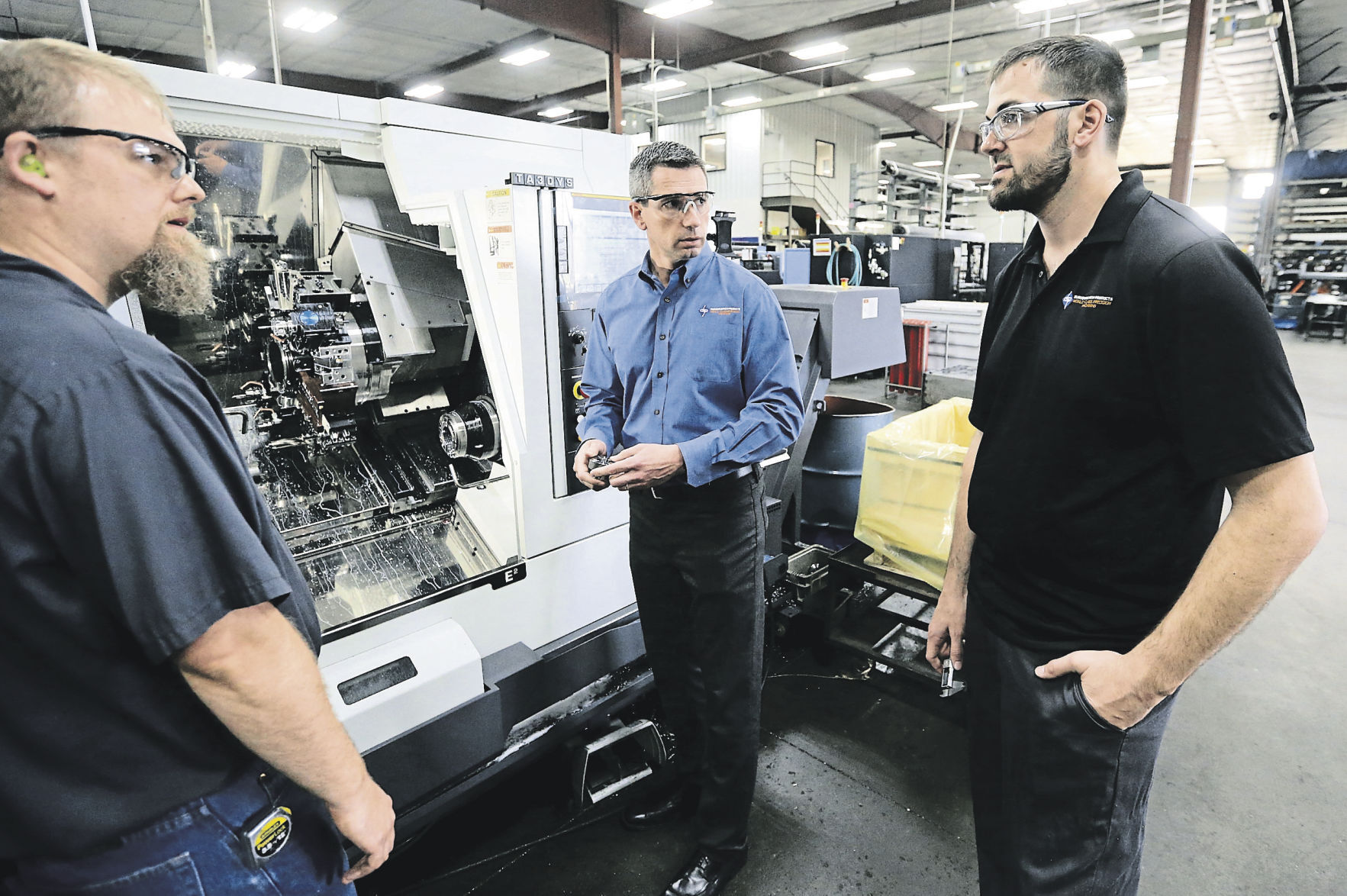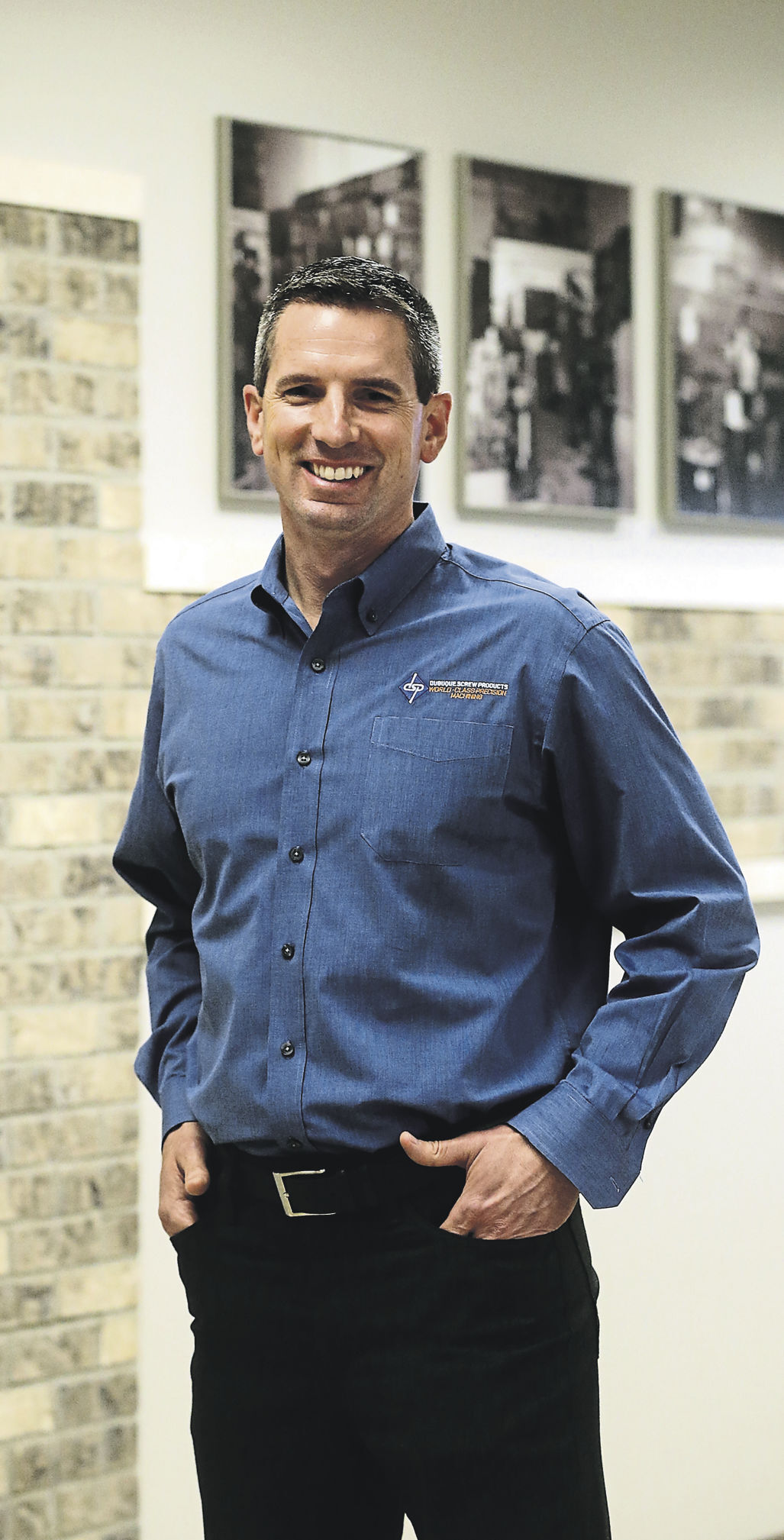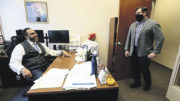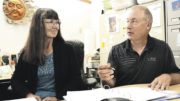The third-generation owner and president of Dubuque Screw Products, Matt Scherr, 43, is leading Dubuque Screw Products from experience.
A graduate of Wahlert Catholic High School, Scherr went on to earn an AAS degree in CNC manufacturing technology from Kirkwood Community College. He paired his education alongside his work as he progressed through every job in the machine shop — a machinist for many years, then plant manager before beginning his role as president in 2016.
While he now performs some duties of his job behind a desk, his heart is on the shop floor, and you’ll find him deep in thought at the controls of a machine or assisting in a maintenance repair. He’s competitive (he got second in the annual Boss’ Day Chili Cookoff by one vote, and it will haunt him until next year), family oriented and philanthropically inclined; Scherr always is looking to learn more.
Scherr participates in the community serving as a member of the DB&T Development Board, 100 Men Who Care, NICC’s CNC Advisory Committee, an assistant ski coach to the Sundown Race Team and a five-year mentor with the Dubuque Community School District to students at Audubon School. Scherr enjoys the adventures of being a father of four children, husband and coach. He keeps active with skiing, volleyball, golf, hunting or anything outdoors.
Can you name a person who has had a tremendous impact on you as a leader?
Working in a family business has blessed me with spending more time with my dad than most father-son relationships. My dad, Mike Scherr, is tremendously impactful in my role as a leader in life and business. I remember earlier in my career when I would ride to lunch with my grandpa and dad and listen to them talk business. I was able to soak in the keep-it-simple mentality of doing business where loyalty, handshakes and being a straight shooter were standard practices. Looking back, I was very fortunate to spend so much time with the two great leaders that built Dubuque Screw Products into what we are today.
My dad has always been a great role model for me, inside and outside of the business. He taught me to always look for the good in people. Through the years, I witnessed so many acts of compassion that didn’t make sense from a business perspective; they didn’t need to. My dad taught me the value of helping others and always giving extended chances to those in need.
What are the most important decisions you make as a leader of your organization? The most important decisions I make as a leader are the decisions directly impacting the staff. Decisions on investing in capital equipment or how many people to hire in today’s business environment have an easier path to a right or wrong answer, in my opinion.
Decisions to create policies or directives that will require compliance from our staff, especially when the matter is not black and white, have to be suitable for the greater good. When leading an organization, there are applicable regulatory requirements that we need to follow, such as DOL, OHSA and the IRS, to list a few. Below that level of rules and laws, as president, I am instrumental in shaping our behaviors and culture. My decisions that affect our organization’s behaviors and culture are made carefully with everyone’s best interest in mind.
As an organization grows, there can be a tendency for the “institution” to dampen the “inspiration.” How do you keep this from happening? Great question. It can be a real problem. I want to highlight three practices I apply to help our organization keep its “inspiration.”
First, I promote an open-door policy. At DSP, we have our doors open for our co-workers to stop by and share their thoughts or opinions. This policy can be advantageous for both parties if boundaries are clear.
Second, transparency is practiced at all times when appropriate. Taking additional time to create clarity can have a lasting impact on promoting an adhocracy culture that will empower your team to understand the inputs before them and how their outputs affect others. Once the big picture is clear, the stage is set for all to engage in inspirational change.
Third, stay connected. I love to talk with the people I work with, so I regularly take walks through our plant to create chances to connect with them. When this happens daily, it supports communication through all levels about all things. Whether we talk about technical aspects of machining or how their families are doing, I am present in the moment and genuine in response. I have found that staying connected through relationships built on trust with employees is critical for exchanging exploratory questions or taking risks together.
Which is more important to your organization — mission, core values or vision? Tricky question, but with only one to pick from, I’m going with vision. During the past couple of decades, I’ve seen and accomplished many organizational goals and objectives with our team here at DSP. Are all our accomplishments aligned? Having a vision for what the organization will look like at its best gives everyone the essential purpose and direction to work together towards collective goals.
What is one characteristic that you believe every leader should possess? An open mind. All great leaders possess a desire to positively impact the personnel and organization they are leading, which requires a continuous effort to improve with excellence for all as the goal. If a leader can be relentlessly consistent with an open-minded approach, then you will inherently become a more informed and effective communicator, listener and decision-maker.
I try not to spend my time focusing on what I already know, which opens my mind to the signals and clues around me to support a deeper understanding of the subject matter at hand. An open mind is enriching and empowering for direct reports and provides an opportunity for them to do the same for their followers. In manufacturing, where change is inevitable, the last thing we want to hear as a reason why is, “Because that’s the way we always do it.”
What advice do you have for future leaders? Follow your talents. Most of the time, to become a leader requires you to be a subject matter expert in a field or industry that you have earned merits in, like a badge on a shirt or letters behind a name. Expertise in your line of work and above-average communication skills should yield a leadership position, and your authentic talent will be the driving force that gives you and your team the confidence to let you lead. After you find success with your talents, identify a purpose, and engage emotionally to align the winning combination of talent, purpose and passion. Make sure the market would say you are talented.
What lessons can leaders take away from the current pandemic? Being a business leader in the pandemic are trying times to say the least. Adapting to the ever-changing information is certainly nerve-racking and is testing leaders in all parts of the world. I quickly realized that I needed help. The main lesson I take away from the pandemic is the value of collaboration.
Internally, I am very proud of how our leadership team leads through this uncertainty, with the primary goal being the health of our staff. The collaboration at DSP from top to bottom throughout our organization has been remarkable. I witnessed, on many occasions, our team putting others first for the greater good. Shifts were rescheduled, daily processes redesigned, space reallocated for distancing and response plans drafted and activated, all in record time.
“
What are two or three of the best things about being a leader? First, I turn to the saying, “Measure success on the seeds that you sow, not the harvest that you reap.” Through the years, you hear a lot of expressions, but this one stuck with me. I love my role in supporting personal and professional development. It’s a beautiful feeling to see someone reach a goal, overcome a challenge, or create a better opportunity for themselves.
Second, treats. What is the definition of treats, you ask? Any act of kindness that was not required and was given genuinely. These treats are like fuel for my soul to continue to expand my faith in people and build armor for the not-so-good times. I’m a big fan of handwritten notes.







